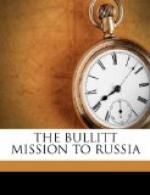Senator Knox. I should think your scruples were well founded. I should not read those telegrams.
Mr. Bullitt. I can simply inform you briefly of the nature of them.
Senator Knox. You might give us the nature of them. To whom were they sent?
Mr. Bullitt. On reaching Petrograd I sent Capt. Pettit out to Helsingfors after I had had a discussion with Tchitcherin and with Litvinov with a telegram, in which I said I had reached Petrograd and had perfected arrangements to cross the boundary at will, and to communicate with the mission via the consul at Helsingfors; that the journey had been easy, and that the reports of frightful conditions in Petrograd had been ridiculously exaggerated.
I described the discussions I had had with Tchitcherin and with Litvinov, and said they had assured me that after going to Moscow and after discussion with Lenin, I should be able to carry out a specific statement of the position of the Soviet Government on all points.
On reaching Helsingfors I sent a telegram to the mission at Paris “Most secret, for the President, Secretary Lansing, and Col. House only,” in which I said that in handing me the statement which I have just read, Tchitcherin and Litvinov had explained that the Executive Council of the Soviet Government had formally considered and adopted it, and that the Soviet Government considered itself absolutely bound to accept the proposals made therein, provided they were made on or before April 10, and under no conditions would they change their minds.
I also explained that I had found Lenin, Tchitcherin, and Litvinov full of the sense of Russia’s need for peace, and that I felt the details of their statement might be modified without making it unacceptable to them, and that in particular the clause under article 5 was not of vital importance. That, on the other hand, I felt that in the main this statement represented the minimum terms that the Soviet Government would accept.
I explained that it was understood with regard to article 2 that the allied and associated countries should have a right to send inspectors into Soviet Russia and see to it that the disposition of supplies, if the blockade was lifted, was entirely equitable, and I explained also that it was fully understood that the phrase under article 4 on “official representatives” did not include diplomatic representatives, that the Soviet Government simply desired to have some agents who might more or less look out for their people here.
I explained further that in regard to footnote No. 2, the Soviet Government hoped and preferred that the conference should be held in Norway; that its preferences thereafter were, first, some point in between Russia and Finland; second, a large ocean liner anchored off Moon Island or the Aland Islands; and, fourth, Prinkipos.
I also explained that Tchitcherin and all the other members of the government with whom I had talked had said in the most positive and unequivocal manner that the Soviet Government was determined to pay its foreign debts, and I was convinced that there would be no dispute on that point.




